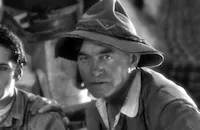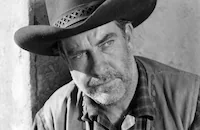Parachute Battalion

Brief Synopsis
Cast & Crew
Leslie Goodwins
Robert Preston
Nancy Kelly
Edmond O'brien
Harry Carey
Buddy Ebsen
Film Details
Technical Specs

Synopsis
On their way to join the Parachute Service at Fort Benning, Georgia, William Mayberry "Bill" Burke, an insecure young man; Donald Morse, a conceited college football star; and Jeff Hollis, an affable hillbilly, meet on the train. En route, the three also meet Master Sergeant Bill Richards and his daughter Kit. Because Richards is wearing civilian clothes, Don mistakes the caterpillar pin awarded to Richards for bravery for a lodge pin and asks Kit for a date, a breach of army protocol. At Fort Benning, Richards visits his old friend, Colonel Burke, the fort commander, and tells him that his son Bill is a new recruit in the battalion. The colonel, who has not seen Bill since divorcing his mother years earlier, asks to see his son, but Richards advises him to let the boy prove himself first. The next day, the new recruits are introduced to their battalion instructor, Richards, who takes a dislike to the self-assured Don. Don plans to ask Kit for a date that afternoon, but when their sergeant, Tex, asks Bill to do him a favor and accompany a friend to the dance, the friend turns out to be Kit, and Don is left dateless. When Bill brings Kit home that night, he confides his fear of skydiving to her. On the day of their first jump, fear pervades the air as first Don and then Jeff jump. Before his turn, Spence, a member of the squad, panics and pulls a gun on Richards but Bill convinces him to hand over the gun. At mess that night, Richards, convinced of Bill's courage, announces that he is the commandant's son, and Bill asks to speak with his father. In commandant Richard's office, Bill confesses his fear and asks for a transfer. Richards, whose full name is William Mayberry Richards, is bitterly disappointed in the boy, and calls him "Mayberry," explaining that Bill was named after him and now he is ashamed to share the name with him. On the day before Bill's transfer, Richards asks him to help drop-test a dummy, and as Bill nears the plane door, Richards pushes him out. They both land in the river and Bill saves Richards' life by pulling him out of the water. His confidence restored, Bill cancels his transfer, and his battalion is assigned to participate in upcoming war maneuvers. Soon after, Don is notified that he is to be promoted to 2nd lieutenant because of his R.O.T.C. experience and announces that he intends to propose to Kit. Don's announcement forces Bill to realize that he loves Kit, too, and as they two men argue, Bill angrily mispacks his parachute. That night, Bill professes his love to Kit, and the next day, Bill and Don are assigned to blow up the powder magazine during maneuvers. When Bill and Don miss their flight because they are fighting over Kit, they are forced to take off in a plane that has no parachute rigging. As Don prepares to jump, his rigging gets caught on the plane's tail wing, and Bill climbs out on the tail and cuts him free. Sharing one shoot between them, they jump to the ground and explode the powder magazine. Their mission completed, the Parachute Battalion receives their medallions, and Kit and Bill make wedding plans as Don begins his pursuit of another girl.

Director
Leslie Goodwins
Cast

Robert Preston

Nancy Kelly

Edmond O'brien

Harry Carey

Buddy Ebsen

Paul Kelly

Richard Cromwell

Robert Barrat
Richard Fielding
Erville Alderson Pa Hollis
Selmer Jackson

Grant Withers
Jack Briggs

Walter Sande
Kathryn Sheldon
Lee Bonnell
Robert Smith
Gayne Whitman
Douglas Evans
Eddie Dunn

Eddie Gribbon
Fred Graham
Allen Wood
Max Wagner
Owen King
Bob Mckee
Lynton Brent
Harold Gerard
Tony Merrill
Jim Pierce
Jack Stoney
Carol Dietrich
Crew
Howard Benedict
Carroll Clark
Major Hugh Fite Air Corps
Roy Hunt
Van Nest Polglase
Renie
Herman Ruby
Sam Ruman
Douglas Travers
John Twist
Richard Van Hessen
Vernon L. Walker
Theron Warth
Roy Webb
Roy Webb

Film Details
Technical Specs

Articles
Parachute Battalion
This sense of modest hesitancy is the sweetest thing about movies like Parachute Battalion (1941), a paradigmatic wartime rouser made for RKO mere months before the bombing of Pearl Harbor. The film's prefiguration of America's entry into the war was not unusual - for almost two years, and with dozens of projects, Hollywood had been priming the American populace for entry into the European war with gusto, enough so that a Senate Subcommittee on War Propaganda was formed by isolationist congressmen, to look into 48 different movies and their "anti-American" Production Code-violating agenda. It may have been just politics in September, when Parachute Battalion was released, but of course by December 1941 the question of Hollywood's hawkishness was a moot point in all regards.
Which gives director Leslie Goodwins' spry little melodrama a feeling of wary anticipation, as buoyant and chin-up as it is on its face. It is a bald-faced recruitment movie, relegating its action to training camp in the titular troop at Fort Benning (the real parachutists of which did the actual jumps). Four young recruits, because they're green, sign up for all the wrong reasons: Edmond O'Brien's fatherless rebel has something to prove, Robert Preston's Ivy League playboy is escaping a scandal, and Buddy Ebsen's corn-pone country boy is just a dumb hick, while Richard Cromwell's tense and unstable loner is a mystery to everyone, including himself, once he loses his nut for good and pulls a gun rather than jump out of an airplane. The extra pay paratroopers get, in contrast to a regular infantryman, irritates a nagging sense of guilt for everyone but the financially-oblivious Preston - you enlist to serve, after all, not to profit.
Naturally, boot camp is seen as rather tranquil and relaxing, and just as naturally there's a love triangle, with officer's daughter Nancy Kelly shruggingly choosing between savvy O'Brien and bravado-oozing Preston, and the issue of O'Brien's paternity - his father turns out to be the platoon's colonel - raises its head for further conflict down the training-course pike. In the meantime, there's so much rudimentary instruction about paratrooping, chute packing and descent management that you come away thinking all you'd need is a little hands-on practice, and you're set. (These were the days, however, when a parachutist had his pack open thanks to a tether attached to the plane itself - your fluency with and confidence in your ripcord was a matter for emergency secondary release only.) Predictably enough, cowardice is the main crucible up in the air, for O'Brien (whose manly self-doubt makes him the subtlest of the protagonists) and the near-psychotic Cromwell, who played essentially the same role six years earlier in Henry Hathaway's Lives of a Bengal Lancer (1935). "Sink or swim!" is the almost inevitable cri de coeur, as O'Brien is shoved out the hatchway against his inner demons.
As so often happens, the primary delight in Parachute Battalion is the octane of personality in use, in the day when Hollywood movies were comprised of interesting people you'd want to spend time with, not computer-generated mayhem you endure as sheer spectacle. O'Brien, still thin, and Preston (fresh from 1939's smash Beau Geste) make for a beguiling pair of mismatched buddies, and as the crotchety master-sergeant in charge John Ford veteran Harry Carey has the gravity and genuineness of an authentic elder statesman, the kind of man whose words are few and therefore precious. In the gallery of familiar faces it's always a pleasure to see Paul Kelly (best remembered as the mysterious man in Gloria Grahame's apartment in Edward Dmytryk's Crossfire, from 1947) as a drill sergeant who at one bizarre point joins in a hoe-down with gangly hoofer Ebsen. Throughout, the characters toil along in their mini-dramas with barely a mention of the war beckoning overseas, but always with an undercurrent of grave apprehension. As well they might; the early pro-war films of '40-'41 offered a kind of war-game idyll, serious about fighting the Nazis in concept but still safe at home, courting the CO's wisecracking daughter and playing pranks in the barracks. Soon, that would all change.
By Michael Atkinson

Parachute Battalion
Quotes
Trivia
Patric Knowles and Charles Quigley were listed in early production charts as actors, but were not seen in the film. Also, Eddie Gribbon is in studio records playing a bartender but was likewise not seen in the film.
The world premiere in Atlanta, Georgia, was attended by members of the 501st battalion who worked on the production.
Notes
Although onscreen credits list actor Richard Fielding as "the Chief of Infantry," the CBCS and Variety review credit Edward Fielding with that role. This film was copyrighted twice. The first entry, LP10646, was abandoned after RKO submitted a second, corrected entry, LP10700. The opening credits acknowledge that the parachute jumps in the film were performed by the members of the 501st Parachute Battalion at Fort Benning, GA. The Hollywood Reporter review adds that location shots were filmed at Fort Benning. According to a pre-production news item in Hollywood Reporter, Lucille Ball was slated for the female lead. Another pre-production news item notes that although the studio originally conceived the picture as a low budget production, the completed script convinced RKO to boost it into the "A" class.
Early production charts in Hollywood Reporter credit George Hively as editor and add Patric Knowles and Charles Quigley to the cast, but Knowles did not appear in the film and the participation of Hively and Quigley in the final picture has not been confirmed. Other news items in Hollywood Reporter note that because RKO was suffering from a shortage of leading man, the studio borrowed Robert Preston from Twentieth Century-Fox and Paul Kelly from M-G-M. The studio also negotiated with Charles Bickford for a top role, but he did not work on the film. The film's premiere in Atlanta, GA was attended by members of the 501st Battalion who worked on the production, and the song "Parachute Battalion" performed in the film was an adaptation of the official song of the army's parachute troops, according to news items in Hollywood Reporter.














